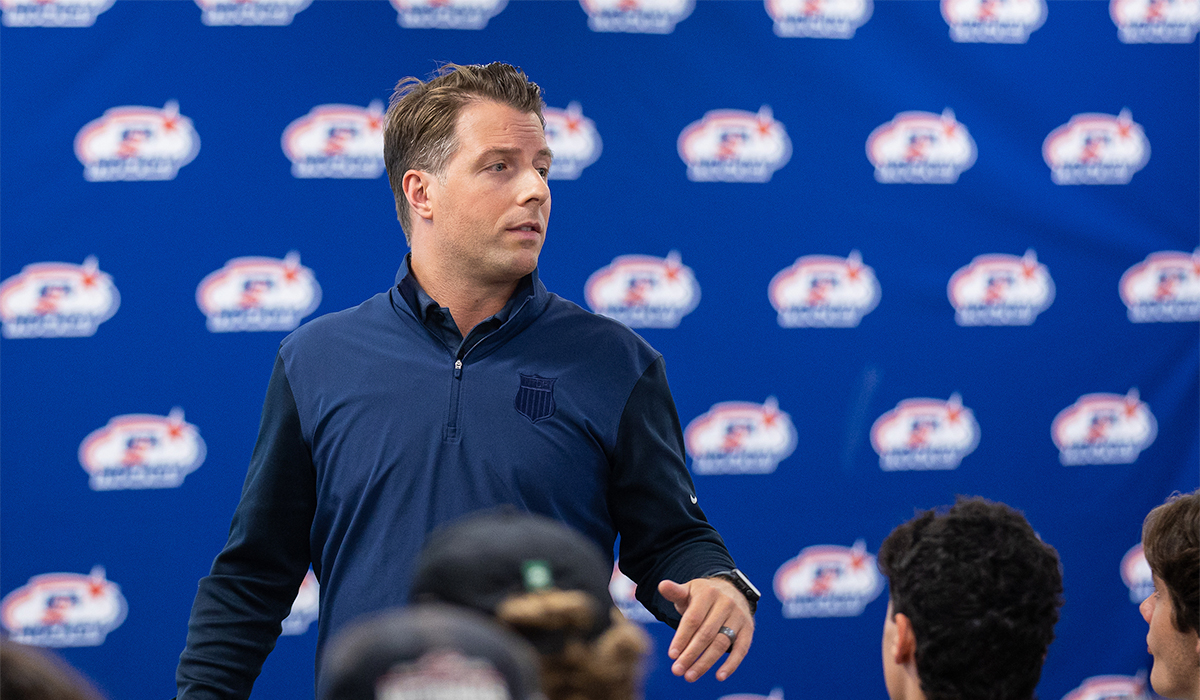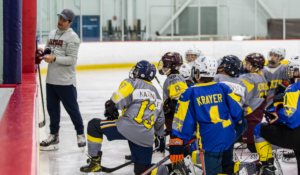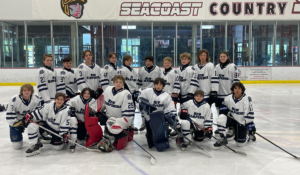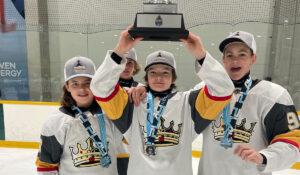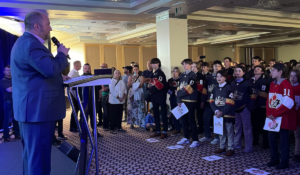Advice from the NTDP’s head of scouting
It is USA Hockey’s premiere destination for American-born youth hockey players.
USA Hockey’s National Team Development Program (USNTDP), located in Plymouth, Mich., brings together top players in each birth year to develop and prepare for international competitions and success at hockey’s highest leagues.
The program’s alumni list reads like a fantasy hockey dream team, with the likes of Auston Matthews, Patrick Kane, Jack Eichel, Zach Werenski, Cole Caufield and Trevor Zegras, as well as the Tkachuk brothers and the Hughes brothers, just scratching the surface of a substantial Wikipedia scroll.
So who gets to play at the NTDP?
Kevin Reiter plays a substantial role in answering that question. As the director of player personnel for the NTDP, Reiter leads the scouting operations, overseeing both the two birth years currently participating in the program, and, more importantly, the birth year that will make up next year’s Under-17 Team.
“My biggest role here with USA Hockey and the National Team Development Program is basically to identify, educate, evaluate, recruit our next group of NTDP players,” Reiter said. “This year, coming into the season, it will be the 2007s. We’ve already picked our 2005 and 2006s. Now in saying that, we’re watching those ‘05s and ‘06s throughout the year, as well, both for guys [outside the NTDP] who may be passing our players up, or we have injuries or we have illnesses or we have academic issues – any things that come along, we’re trying to find replacement players… One of our interns was recently going through some of the paperwork from last year and he said, ‘you guys had more than 75 players come and practice with you’ just from when we’re short bodies or different things.
“In short, my main role is knowing these birth years, one we’re actively educating, scouting and recruiting, and then the two we have here with the NTDP.”
While the majority of youth hockey players will not make the NTDP — players from other countries need not even apply — understanding what they look for in a hockey player, both on and off the ice, is valuable information for anyone aspiring to reach hockey’s highest levels.
“I think from our perspective, there’s a big misconception that everyone thinks we just want the best players,” Reiter said. “I can tell you that we’re looking for the right players for our program. Ones that have the inner drive, perseverance, can be successful on a daily basis. We’re looking for players who we truly believe over a course of two years will develop and reach their true potential and someday they will help us win a gold medal internationally. I always tell parents one of the biggest things is that we want good young men who come from good families who will represent our country in a first-class manner, and that’s on and off the ice, on a daily basis, no matter who they are dealing with or where they are at.
“Whether it’s a teacher, it’s at a Holiday Inn somewhere, they’re on a plane to wherever – we don’t only want to be proud of them as hockey players, but as human beings, as well. This place is for players who are driven and want to be hockey players. Our players face a tremendous amount of adversity, and it’s all about how they respond.”
In terms of what he’s looking for on the ice, here’s a breakdown of Reiter’s most important traits:
Skating
“The game’s fast, and it’s getting faster. You have to be a good skater. It’s funny, having been here for a while now, having some of the players come back and talk, some of those first guys I worked with here, the Zach Werenski‘s and the like, they’re talking about how fast the game’s getting, and how much faster it is now. You have to be a good skater because the game’s fast.”
Stick/Puck Skills
“Obviously we talk about stick skill, how important it is, because you need to be able to make plays. There’s a certain threshold of skating and stick skill and all that to be a National Team player. You have to make plays in tight areas and not just play one-on-one hockey — a lot of youth hockey is one-on-one but your ability to use your teammates and make give-and-go plays, that’s going to help us play fast and that’s one of our mottos as a country.”
Hockey Sense/IQ
“We talk hockey sense, hockey IQ all the time. Players that can think the game at a high level, they’re able to get better and better because they can take what our coaches tell them and apply it – and apply it quickly. We’re looking for guys who create time and space for themselves and their teammates, and playing away from the puck is a big one. Ninety, ninety-five percent of the game is playing without the puck, and putting yourself in good places. We need players who are able to find that next play and are able to have patience. Guys I’ve been around here, they have an unbelievable amount of deception and manipulation skills. Scanning the ice is a big one now that [NTDP Under-18 Team Head Coach] Dan Muse is talking about, knowing and being aware of their surroundings – processing that information and being able to find that next play.”
Competitiveness
“Our coaches say it all the time, ‘wins in life, wins in hockey’ – we’re looking for natural competitors. Our best players treat every drill in practice and in skill sessions, they’re out there for a purpose, they want to compete and get better. They show up every day to prove that they’re not only the best player in their birth year or the country but in the world. Some of the top players that have come through here, that’s what separates them from other players – they just have an inner drive. When they wake up, they want it more than the next guy and they have an extraordinary work ethic. There’s no substitute for hard work. The competitiveness, inner drive, perseverance, those things are really important.”
There’s a lot more to it than that, however. Reiter talked about scouting for character, which is crucial to the NTDP, but not unique for player evaluation. Think a team only cares about what you do on the ice? Think again. The NTDP — and a lot of other programs — will be digging deep into your hockey background to learn more about what type of person you are, both to decide on whether you belong on a Team USA roster, and also if you’re going to thrive while doing so.
“We talk about character a ton,” Reiter said. “You have to be a great teammate. You can’t be a great hockey player without being a good person, is what we say. Being a good teammate, having a team-first mentality, being coachable, our coaches say it all the time, we don’t want to coach punks, we don’t want to coach guys with bad body language or who aren’t good teammates or are going to talk back if we’re going to talk to them, yelling things at a teammate, coming back to the bench and slamming their stick, all of those things are things we’re looking for and trying to figure out. For me, character is huge and we dig and dig and dig as much as we can, not only with former coaches but maybe current teammates, current people that are in their circles, how do we get to know these players as much as we can because character is becoming more and more important.”
The NTDP U17 Team plays a full slate of USHL games, along with international competitions. The NTDP U18 Team gets NCAA Division-I opponents thrown in, too. It’s all on purpose, as they put the players through as much adversity as possible. Whether you play there or play elsewhere, you’re going to get pushed to your limit if you want to ‘make it’ in hockey.
“The best ones here, they get back up. They’re still confident, they’re not embarrassed by failing. You know how much adversity we put our guys through here, and they just keep getting back up. It’s pretty neat to watch, and I always just go back to the best guys because now, I’ve got a perspective through experience, not that it’s fool-proof by any means. Projecting players, believe me, is difficult. You have to find out which players can make the most growth here among their teammates in two years. It’s pretty cool to see now which guys made it and why they made it and other guys, this is probably why he didn’t make it.”
So what else can players — and their parents — do to help their chances of hockey career success? Reiter said it’s crucial to surround yourself with the right type of people.
“My goal is to give parents and players all of the information so that they take that information and hopefully make the best decisions possible as they navigate this hockey world. I’ve got a lot friends – it’s weird, I’m getting older – with kids who are coming up in those certain age groups, and surrounding their sons and daughters with coaches and support staffs and team managers who, here at the program, we deeply care about their sons, and that’s what you want. That’s who you want your kids to be around. Those types of situations. In my opinion, there are some youth hockey organizations that could be toxic, but finding a place, I just relate to what we do here, we show up here every day, and meet all of the time about how can we make these players better. Finding a way to make your son better. The coaches spend a ton of time together trying to figure out how to make these players better, not only better hockey players but better people.
One piece of advice, specifically for the parents? Don’t make it harder.
“We need parents to support their sons and daughters and not make it harder for them. We want them to embrace the adversity they’re going to have throughout the year, but block out all the noise, block out the distractions, things that don’t matter. If they can help their kids focus on being a good teammate, embracing the adversity that’s going to happen, and just choosing excellence on a daily basis, they’re going to grow, they’re going to become better hockey players, and they’re going to have a good experience and have an opportunity to make our team.”
In the end, it’s all going to work itself out.
“We often talk about how the player pool changes drastically. Seth Appert talked the other day about Joel Farabee and Logan Cooley. A few months before the NTDP tryout, they weren’t named to the Youth Olympic roster. Parents could have went crazy, and you know what? We didn’t get a call. They just believed in the process, trusted the process. Joel Farabee got called up at the end of his first year and ended up helping the ’99 team win a World Championship. Logan Cooley wasn’t on the Youth Olympic team, and we can argue where he was at when he came in here, but they both ended up being the best player in their birth year at the end of the two years.
“One thing we always say is that the path isn’t going to define the player, that player is going to define their path with their work ethic, their talent, their character, their decisions on a daily basis – that’s going to determine their path.”
Want more in-depth insight from hockey experts like Kevin Reiter? Follow WHH for exclusive content from around the world on Facebook, Instagram, Twitter, TikTok and YouTube.
